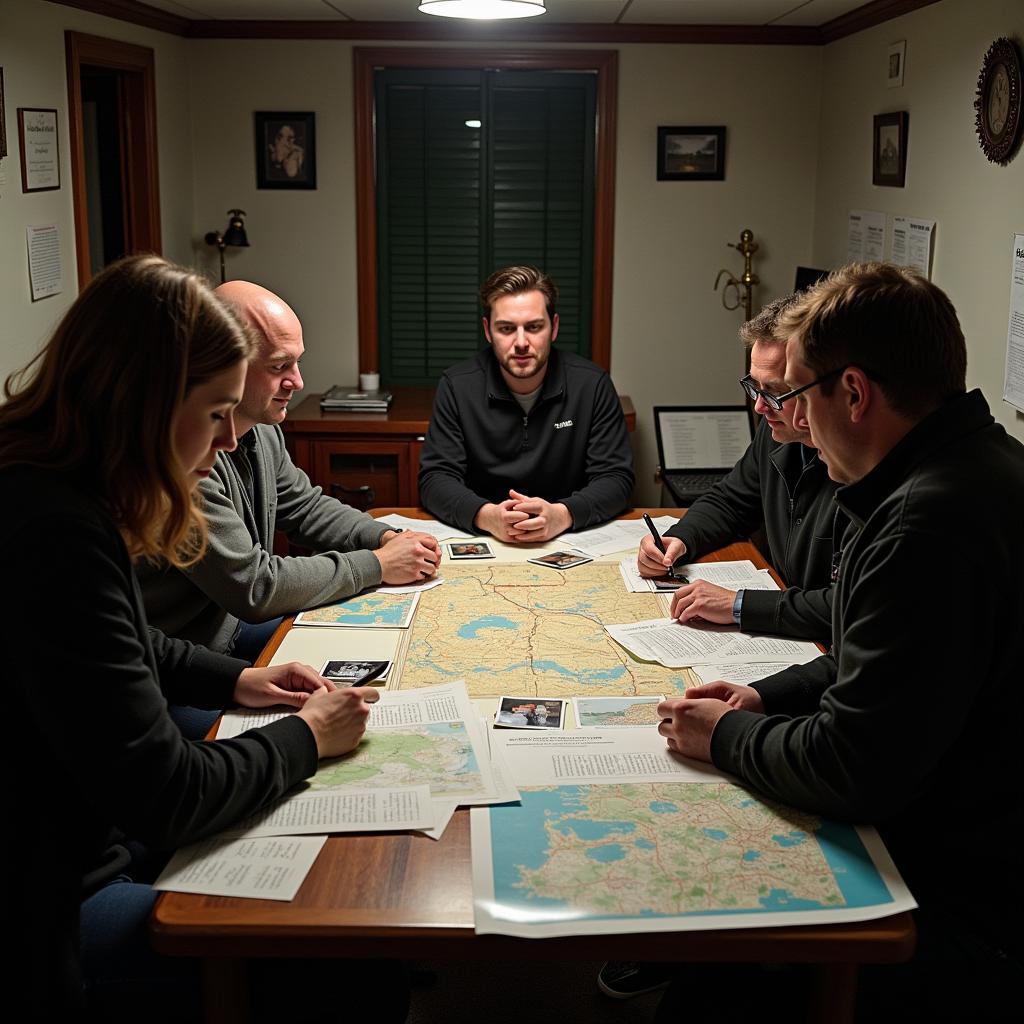Delving into the world of the unknown often requires more than just a lone investigator with a flashlight and a camera. The most compelling and credible paranormal research often stems from the collaborative efforts of a Team Of Researchers. These teams bring together a diverse range of skills, experiences, and perspectives, creating a synergistic approach to understanding unexplained phenomena.
Why Team Up for Paranormal Research?
Investigating the paranormal is rarely a straightforward endeavor. Individual biases, limited expertise, and the subjective nature of experiences can cloud judgment and hinder objectivity. This is where a team of researchers becomes invaluable. By pooling their knowledge and skills, they can:
- Minimize Bias: Multiple viewpoints help identify and mitigate personal biases that might skew an individual’s observations.
- Enhance Data Collection: Different team members can specialize in various types of equipment and methodologies, leading to more comprehensive data gathering. For example, one researcher might focus on EVP (Electronic Voice Phenomena) recording while another monitors electromagnetic fluctuations.
- Cross-Validate Findings: Each team member independently analyzes the data, strengthening the validity of findings when multiple researchers reach similar conclusions.
- Provide Emotional Support: Paranormal investigations can be emotionally taxing. A team provides a built-in support system for its members, creating a safer and more comfortable environment.
Key Roles Within a Paranormal Research Team
While the specific roles may vary depending on the team’s focus and size, some common positions within a team of researchers include:
- Lead Investigator: This person typically oversees the investigation, delegates tasks, and ensures adherence to ethical guidelines.
- Tech Specialist: Responsible for operating and maintaining the technical equipment used to detect and record paranormal activity.
- Historical Researcher: Gathers background information about the location being investigated, researching its history, previous occupants, and any reported paranormal occurrences.
- Interviewer: Conducts interviews with witnesses, gathering firsthand accounts of experiences and seeking patterns or corroborating details.
Building a Successful Research Team
Assembling a successful team involves careful consideration:
- Shared Goals: Members should align on their research objectives and methodologies to avoid conflicts and ensure a cohesive approach.
- Diverse Skillsets: A mix of technical proficiency, historical knowledge, and interpersonal skills strengthens the team’s capabilities.
- Open Communication: Honest and respectful communication is crucial for sharing observations, debating interpretations, and resolving disagreements.
 Paranormal Research Team Meeting
Paranormal Research Team Meeting
The Future of Paranormal Research: Collaboration is Key
As the field of paranormal research evolves, the importance of collaboration will only continue to grow. By embracing a team-oriented approach, researchers can strive for greater objectivity, rigor, and ultimately, a deeper understanding of the mysteries that lie beyond our current comprehension.
If you’re interested in exploring the world of paranormal research, consider joining a local group or connecting with other enthusiasts online. By working together, we can shed light on the unexplained and advance our collective knowledge of the unknown.
FAQs about Paranormal Research Teams
- What qualifications do I need to join a paranormal research team? Most teams welcome individuals with a genuine interest in the paranormal. While formal qualifications aren’t always required, having skills in photography, videography, research, or technology can be beneficial.
- How do I find a reputable paranormal research team? Start by researching local groups online or attending paranormal conferences and events. Look for teams with a code of ethics, a commitment to scientific principles, and a history of credible investigations.
- Is Paranormal Research dangerous? While paranormal investigations don’t inherently pose more danger than any other activity, it’s essential to prioritize safety. Always investigate with a team, obtain permission to access locations, and be respectful of the environment and any potential entities present.
Interested in learning more about specific research methods or the experiences of seasoned investigators? Check out our articles on [identify one way faculty researchers can possibly](https://midatlanticparanormalresearch.com/identify-one way-faculty-researchers-can-possibly/) and footsteps researchers.
For insights into the world of academic research, you can delve into topics such as how much do clinical researchers make or explore the work of a film researcher. And for those intrigued by the intersection of technology and research, our piece on the association of internet researchers might pique your interest.
Remember, the quest to understand the paranormal is an ongoing journey. By embracing collaboration, open-mindedness, and a thirst for knowledge, teams of researchers can continue to push the boundaries of our understanding and unlock the secrets of the unknown.
Let us know if you have any other questions. You can contact us by phone at 0904826292, email us at research@gmail.com, or visit our office at No. 31, Alley 142/7, P. Phú Viên, Bồ Đề, Long Biên, Hà Nội, Việt Nam. We have a dedicated customer service team available 24/7 to assist you.